A shrewd investment in his industrial arts education has paid hefty dividends in his manufacturing career.
Just to be clear: George Wurtz III ’78, president and CEO of Soundview Paper Co. LLC, fully intended to teach industrial arts after graduating from Oswego. Hardwired with his grandfather’s love of woodworking and machinery, Wurtz had graduated from a premier high-school industrial arts program. He had turned down offers to play football for Penn State and Army in order to enroll at Oswego. He had worked grueling summer construction jobs to pay his tuition in cash.
In 1978, industrial arts education degree in hand, Wurtz was ready to roll. He was weighing job offers from two school districts when Miller Brewing in Fulton offered him an inventory control job at twice the salary. Wurtz made a decisive course correction and followed the money—and a hunch that manufacturing might be an even better fit.
A Home Run?
 While student teaching in Valley Stream, Wurtz sensed a red flag. His trailblazing lesson plan required students to design a product, then form a company to build and sell it. “The students loved it. They asked for extra lab time,” Wurtz remembers. “It looked like a home run.”
While student teaching in Valley Stream, Wurtz sensed a red flag. His trailblazing lesson plan required students to design a product, then form a company to build and sell it. “The students loved it. They asked for extra lab time,” Wurtz remembers. “It looked like a home run.”
The school’s administrators made a different call: “You’re not a business teacher,” they scolded Wurtz. “You’re an industrial arts teacher.”
Fortunately, the manufacturing industry embraced such ingenuity. Wurtz shakes his head when he remembers his first meeting with Miller Brewing. “The interview date changed at the last minute. I had planned to get a haircut and wear a suit. Instead I had to go straight from the Industrial Arts lab, looking like Jeremiah Johnson with my long hair and overalls.”
“This was after the Vietnam War, and there was a shortage of engineers,” explains Wurtz.
“Industry was recruiting from ‘tech programs,’ and Oswego had one of the best in the country.
“An industrial arts degree looked a lot like a degree in mechanical engineering, with hands-on math, chemistry and physics labs,” he reports. “A number of my classmates went into industry instead of the classroom.”
The Scenic Route
Thirty-five years—and 17 address changes—later, it’s tough to imagine the larger-than-life Wurtz on any other trajectory. He spent almost a decade with Phillip Morris, the parent company of Miller Brewing. “It was like earning a Ph.D. in executive management,” he says. “I worked under industry icons. My ears were as big as Dumbo’s, taking it all in.”
In 1987, Wurtz was recruited into towel and tissue manufacturing, a subset of forest products, the nation’s third largest industry. He spent the next 15 years helping to build Fort James, home to such household brands as Brawny and Dixie Cups. When Georgia Pacific bought Fort James for $7.5 billion, Wurtz helped guide the merger then joined the new company in Atlanta, Ga.
Within a few years, Wurtz was second in command at Georgia Pacific. As executive vice president of pulp and paper, he was responsible for seven companies, 10,000 employees, and $6 billion in annual sales.
“I learned a lot working at the decision-making level of giant companies,” he says. “I discovered I loved mergers and acquisitions. But I always dreamed of walking away and creating smaller, leaner, more nimble companies, managed by hands-on investors who were also seasoned practitioners.”
Object Lesson
 The opportunity to lead his dream company came last year, when Wurtz, with equity investment firm Atlas Holdings, purchased Marcal Paper Co., a storied New Jersey towel and tissue company on the brink of closure.
The opportunity to lead his dream company came last year, when Wurtz, with equity investment firm Atlas Holdings, purchased Marcal Paper Co., a storied New Jersey towel and tissue company on the brink of closure.
In 2006, Wurtz—by then an industry icon—stepped away from corporate life when Koch Industries acquired Georgia Pacific. After decades in the fast lane, he hoped to spend more time with his wife, Nancy. “‘Miss Nancy,’ as they say in Atlanta, is my true love,” Wurtz says, “along with my daughter, Jacqueline, who has three wonderful boys under 4, and my son, George IV, who carries on the towel-and-tissue tradition.”
Wurtz also looked forward to stretches of time in his woodworking shop and aboard his 60-foot fishing boat. “My ideal day involves hooking a 1,000-pound tuna,” he explains. “But when that didn’t happen every day, I grew restless.”
High-energy Wurtz went back to work as CEO of WinCup in Stone Mountain, Ga., a massive but troubled supplier of foam cups, straws and other food service disposables. “I’d never
been associated with a company in bankruptcy,” he reports, “and I discovered I love fixing broken stuff.”
Wurtz was trolling for other stressed companies when Marcal Paper in Elmwood, N.J., caught his eye. “A product like toilet tissue isn’t going away,” he believes. “You can’t (digitalize or) cloud it. And China can’t compete in our market, because it’s not profitable to ship.”
The Lure of Marcal
When Wurtz and Atlas Holdings purchased Marcal in 2012, the floundering company had nearly lost sight of its proud history. Marcal was founded in 1928 by a resourceful Sicilian immigrant, Nicolas Marcalus, whose 17 patents include the jagged metal edge used to cut waxed paper and the first automatic toilet tissue winder.
Marcal, which pioneered the use of recycled paper to make towels and tissue, flourished for 70 years. In 2001, the family-run business borrowed $125 million for a new paper machine—a wise investment, it seemed, until 9-11 and Hurricane Katrina knocked the wind out of the economy. A few years later, the bank called in the Marcal loan.
In 2007, on the brink of bankruptcy, the family sold to venture capitalists, who planned to take the regional company national. “Going national wasn’t the answer,” according to Wurtz. “Thirty-eight percent of the domestic towel and tissue market lies within 500 miles of the Marcal plant.”
“The company had a lot of pride but lost its way,” Wurtz believes. “By the time we took over, its workforce was emotionally decimated.
“We had to let 100 people go, but we saved 500 jobs,” he reports. “Those workers are this company’s greatest asset. Many are immigrants from Eastern Europe. The typical employee has been here for 18 years and most likely has a father, brother or sister who works here.”
First-Name Basis
The outgoing, straight-shooting Wurtz now spends much of his time mingling with Marcal employees. On his daily walkabouts, he covers an average of 3.5 miles and greets almost every employee by name. “These workers have done nothing but work hard for Marcal, even as many lost their pensions,” says Wurtz. “I love ’em to death.”
From the Nest

Students in the Department of Technology learn about the career path of George Wurtz III ’78, center, who spoke with them in the new Manufacturing Systems Laboratory this spring.
Part of this allegiance dates back to Wurtz’s down-to-earth Long Island childhood. He and four siblings (including Kevin ’79 and Thomas ’92) were instilled with a strong work ethic. Each child was allowed to play one sport and expected to hold a job during its off-seasons. (Wurtz worked on a commercial fishing boat).
“My father was a union worker for the public utility company,” Wurtz says. “He’s always reminded me that ‘Joe Hourly’ will make or break you. Success doesn’t happen in the executive suite.
“Football also taught me that you’re only as good as the guys behind you,” he adds. “From my corporate years, I learned that, if you’re not making it or selling it, you are overhead.”
On a recent tour of the one-square-mile Marcal campus, Wurtz was walking the talk. At one point, the strolling CEO and a recycling truck approached the same intersection. Wurtz gave the driver a friendly salute. The driver stopped, smiled, and gestured for his boss to go ahead.
“No, you go ahead,” Wurtz chuckled. “I’m paying you.”
On a Roll
Since Soundview took charge, the Marcal plant has operated three shifts a day, seven days a week. Volume has increased by 22 percent. Equity investors have earned 44 percent dividends. Employees recently received their first gain-sharing checks. In December, Soundview purchased a second paper plant, Pultney Paper in Vermont.
The Soundview company carries no debt. Fifty percent of profits are invested in operations. “We pay it forward,” Wurtz explains. “When we buy a stressed company, our goal is not to buy, fix, and sell. Our goal is to buy, get it going, and keep it going.
“We came into Marcal making huge promises,” Wurtz reflects. “Now we’re delivering on these promises—and regaining a lot of trust.
“Saving jobs is at the heart of our work,” he says. “For decades, our country’s manufacturing base and its middle class have been eroding. But the American spirit is still alive. You see it when we pull together after events like 9-11, Hurricane Sandy, and the Boston Marathon bombing.
“Americans are very productive people,” says Wurtz. “I believe we have a strong shot at reviving manufacturing.”
A strong shot indeed, if that revival is fueled by towel-and-tissue titan George Wurtz ’78, with his boots-on-the-ground leadership style, wide-angle view, and ever-versatile Oswego degree in industrial arts education.
Long-Range Lesson Plan:
Unbeknownst to George Wurtz III ’78, Oswego was preparing him to embrace the unexpected.
George Wurtz never used his Oswego degree in the classroom, but it’s been a priceless asset in his corporate career. “Industrial arts is the perfect training ground for manufacturing,” he says. “Everything I learned in industrial arts education applies to running a company. They taught us to be good managers without calling it management.
“We learned to create lesson plans, which are essentially business plans. We learned to establish objectives, to control costs, and to measure progress. We learned that good leadership is about good teaching—emphasizing what’s going well and teaching what could be even better.”

Charles Edic ’14, a technology management major, shows a prototype of his class project, a steady-grip device for a camera, to George Wurtz ’78 during Wurtz’s recent visit to campus.
To acknowledge Oswego, George serves on its Engineering Advisory Board, shares executive suite insights on sharpening Oswego’s competitive edge and has established an Engineering Excellence Fund. And as a featured guest in the Alumni-in-Residence Program, he likes to underscore the enduring importance of Oswego relationships. “In college, you grow socially as well as academically. My best friends are still my college friends,” he reports.
Those college friendships may evolve into professional relationships.
Wurtz and Ron Schulman ’77, who crossed paths early in their manufacturing careers, recently reconnected through LinkedIn. “One thing led to another,” says Wurtz, “and Ron is now our comptroller at Soundview.”
Speaking of the unexpected: rugby represents another surprise turn in Wurtz’s life. In 1974, the 6-foot-3-inch middle linebacker arrived at Oswego ready to play football, only to learn the program had been cut. The skeptical freshman, who had been recruited by Penn State and Army, reluctantly joined Oswego’s rugby team. Almost 40 years later, Wurtz—a master of corporate mergers —still considers this his favorite.
“The rugby players taught us how to laugh, and we taught them how to tackle. After the game, you sing songs and drink beer with your opponents,” he says. “My rugby friends remain my closest friends. Many still play every summer in the CanAm Rugby Tournament.”
When Kevin Gilman ’74, the coach/catalyst of this spirited group, passed away in 2009, the rugby bond grew even stronger. Wurtz spearheaded the establishment of an endowed memorial scholarship and rugby fund to honor his friend.
“There is such cool camaraderie in rugby: part fraternity, part family,” says Wurtz. “I’ve learned it’s the greatest game ever played.”
You might also like
More from Alumni Profiles
Astrophysicist, Yale Professor Credits Oswego with Setting His Course for Stellar Career
Astrophysicist, Yale Professor Credits Oswego with Setting His Course for Stellar Career Earl Bellinger ’12 is one stellar guy. A quick review …
BHI Alumnus from Liberia Gains World of Experience
BHI Alumnus from Liberia Gains World of Experience Otis Gbala M’23 became the first SUNY Oswego graduate who studied from Liberia …
Couple’s Loyal Support for Oswego Spans Five Decades
Couple’s Loyal Support for Oswego Spans Five Decades Marilynn “Lynn” Nagy Farrar ’61 and Neil Farrar cherish their memories of Oswego …

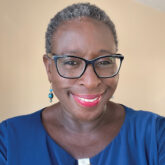
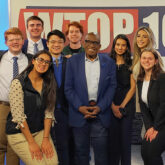
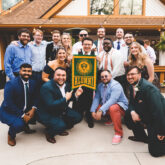
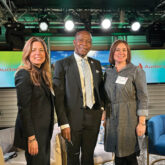

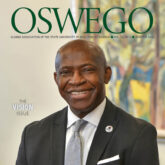

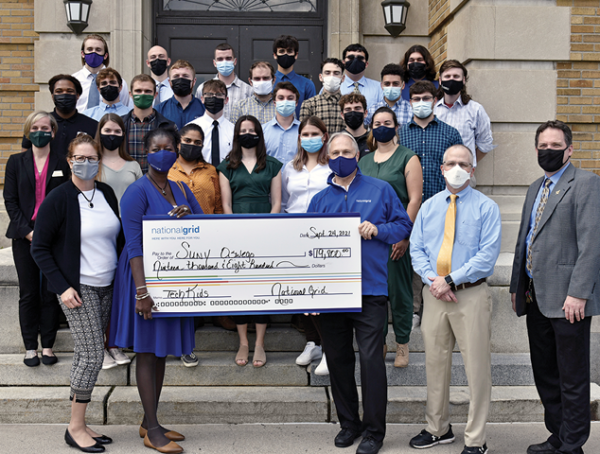
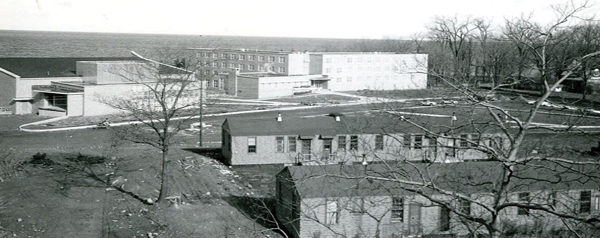
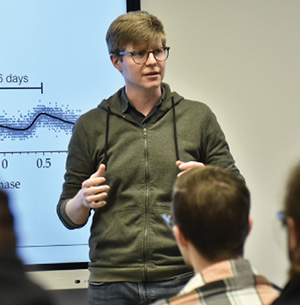
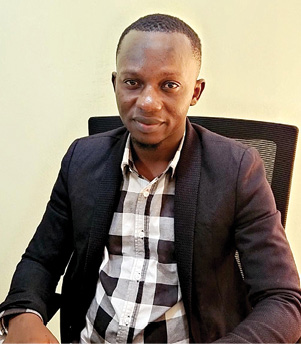
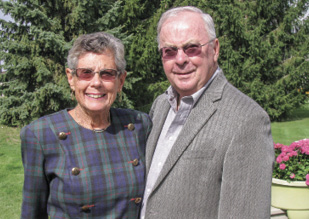
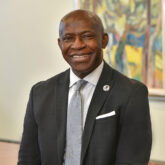

1 Comment
Member of class of 1979, working at Wuinnipiac Unversity in Hamden Ct. I teach TV studio production after 25 years in the video business. I owe all my success to Vince Doody. Just wanted some one to see this.